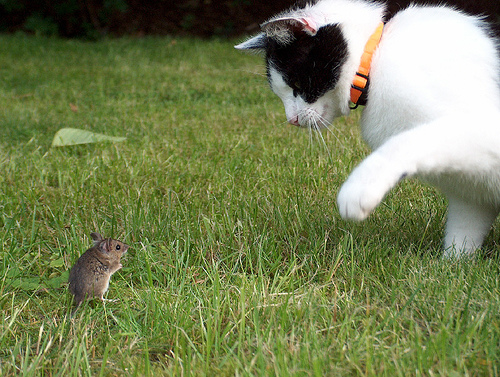Eek! EBooks!
We’ve been looking at the explosive trend of eBook distribution and the decline of traditional publishing these last few weeks. I want to share a few more points impacting the old model of publishing and contributing to its downfall. So many forces are tearing it down, and here are a few that Mark Coker, founder of the eBook distribution site Smashwords, mentioned in his eBook seminar:
- Book selling is moving to the web. Consumers are looking for low prices, convenience in purchasing, and selection. Because eBook distributors have unlimited “shelf space” to showcase innumerable books, this allows millions of books to sit side by side. Publishers are losing power and control over this “shelf space” and how books are purchased. In the past, they owned the printing presses necessary for a book to be published, so they called the shots. That is true no longer. With POD (publishing on demand) printing, anyone can publish their own print book and distribute it online—not even need to tussle for shelf space in a brick-and-mortar bookstore.
- Reading is moving to screens. EBooks are now outselling print books, and the increase of eBook sales in proportion to print books is growing exponentially.
- The number of self-published books is rising as traditional books decline. Indie authors can outsell traditionally published authors with little investment.
- Profits are higher—and this is drawing some authors away from traditional publishers. We are hearing of many best-selling authors refusing to give their publishers any eBook rights. They now sell their new releases as eBooks on their own sites, or on sites like Smashwords or Kindle Direct and keep all the profits. And how do those profits compare? When your traditional publisher sells a print copy of your $8 book, you receive about 40 cents in royalties. However, if you sell one eBook online at .99 cents, you keep anywhere from .60-.99 cents, depending on where you are selling that eBook. You make more money per sale with an eBook than you do by selling a book through your publisher. And lower sale prices mean more readers=more sales. You, as the author, get to set your eBook price, too, which means if you want to give your book away for free for a while to draw in new readers, you can do that. The author now has much more control over where, how, and when their books will sell.
Worldwide Access
One of the things I found intriguing and compelling from Mark’s talk was the understanding that there are millions of readers worldwide whose only or best access to purchasing and reading a book is through their phone. He spoke of standing in a town in Africa and noting that there were no bookstores in the rural area around him, and no Internet cafes, but . . . everyone had a phone that could connect to the Internet and had access to software to be able to download books. Traditional publishers haggle over foreign rights, limiting access to millions of potential readers. Whereas, if you put your book up on an eBook distribution site like Smashwords, people all over the world can discover, download, and read your book. And the best part for you, the author, is that to do so is free.
I hope these trends will get you thinking. Formatting your manuscript into an eBook form to upload to most sites is fairly easy. Of course, just putting your book online doesn’t assure you will sell millions of copies. But neither does selling your book to a traditional publisher. In both instances, it is really up to you to market your book. But at least with eBook publishing, you will keep most of your profits, and can have full control over the look of your book, its content, the cover, and where and what type of format you want to distribute your book.
Amazing Exposure
I put three novels online as eBooks two months ago. In the first thirty hours, I had nearly 1,500 downloads, and reviews from new readers are starting to come in, and they are blogging and tweeting about these books that have been sitting inside my computer waiting for a traditional publisher to buy them. They are “happier” out there getting read and discovered—and so am I. I am glad that I can slowly and steadily grow my fans and readership without having someone else able to pull my books “from the shelves” due to slow sales. From what Mark Coker says—and I found this very reassuring—eBook sales grow slowly at first, but with steady nurturing and watering, they do grow. He gave many examples of books that made a profit of $7 total their first quarter, but as the author built on his or her reader base, using social networking and other methods to get the book known (he has a great marketing guide with suggestions of ways to market your eBook), the sales grew. Some have gone on to make profits of six figures in under two years after uploading their eBook. And this ties in greatly with the whole concept of developing 1,000 fans, as tech guru Kevin Kelly posted on his Technium website (much more on that in future posts, but if you are curious and want to learn the secret to true success, read his post: http://www.kk.org/thetechnium/archives/2008/03/1000_true_fans.php).
There’s Hope
We’ll be looking at more trends and stats regarding the publishing industry in upcoming blog posts, but I hope these facts are getting your gray cells working a little, and also giving you hope. I believe the true way to achieve success, a feeling of significance, and real joy and satisfaction as a writer will be to provide a way for your books to be discovered by genuine fans you can interact with and hear from, and who will not just be numbers on a royalty statement of sales but will be your real readers. That’s why we write, isn’t it? To reach readers with our words and concepts, and share our hearts. Maybe some find their greatest joy seeing a royalty check with lots of zeros on it. But if your true wish is to see your books touch hearts, change lives, or just make someone laugh, stick around. I’ve got some ideas and a radical new way to look at the writing life and how to write for your life.












A very interesting post. I’m sure in a few years paper books will be largely confined to cheap, badly made paperbacks selling in supermarkets, and beautifully produced high quality limited editions selling on-line from small presses. There will be little else in between. Probably lavish coffee table photo books will survive as they can’t be replicated in size and quality of image on an iPad or similar. Otherwise we’ll all be reading on various handheld devices. We can see it happening with used books, which are now cheaper, even accounting for inflation, than they were 20 years ago.
E-books are certianly something all writeres must hop on, if commercial success is the objective. Yet, I do not feel they will entirely replace paper publishing, as e-books are not exactly as permanent. They can be easily lost through a device malfunction. After all, they’re only little currents in fragile devices. Furthermore, I believe they will eventually render old paper books more valuable, due to their increased potential permanence – and, not as easy alterability as a storage medium.
But then again, I may not be fully grasping the concept…
Thanks, as usual a great article
Paul v Walters
Congrats on some impressive ebook sales.
I am reading Game of Thrones in a paper back version my wife purchased. Honestly, I wish it were on my kindle. It would be easier to read, and I would have access to the book from my phone.
I love books, and I never thought I would find myself saying this. Ereaders are a better reading experience.
Susanne: I found your blog very interesting. Since the last week of 2011, not so long ago, I have been involved with a project dealing with the same subject.
It has its own site http://www.indiePENdents.org and its goal is to make independent writers join forces to gain access to libraries and bookstores. It is a free, nin-commercial group with the sole purpose to take the stigma from the indies. We propose to professionally review new books and give those who are worth it a PEER REVIEWED seal, for free. Yes, not introductory free, but permanently free. We are currently involved in a spirited discussion as to what criteria to use so that our imprimatur will be meaningful and respected in the industry. Please take a look at our credo and proposals. Maybe we could join forces, exchange blogs. Join us!
As a reader, I have to admit I LOVE ebooks!! It is so convenient for me to have instant access to countless books with me all the time. Whether on my phone, iPad, or laptop.
However, as a reviewer there’s a downfall for me. Although I prefer to read ebooks, I like to have a physical book to give away. Offering a chance to win a book gets people to come to the blog and at least read about the book and the review. Which I see as my “job” as a blogger to help promote great books.
The other downfall for me, is once I read a book, I probably will never read it again (on purpose) so I have all these ebooks and nothing to do with them. Not a huge issue and Amazon is starting to give the ability to loan books.
Just the rant of a reader
That’s a great comment. I have books out in print that I send to reviewers, but I also have some only as eBooks, so to get reviewers to review, I would have to give them a coupon (Smashwords is good for this) to allow them to download a free copy, but that only works if 1) the reviewer has an ereader and 2) they want to read electronically, and many don’t. However, I think this will get to where reviewers will be sent a downloadable file. When I went to BEA a few years ago, I was given many ARCs (advanced copies) by way of a four-color card with download instructions to read on Adobe Digital Editions. It was a new experience for me to do that, but I read some great books that way and didn’t have to haul another suitcase full of ARCs back from BEA.
Holly,
You wrote, “However, as a reviewer there’s a downfall for me. Although I prefer to read ebooks, I like to have a physical book to give away. Offering a chance to win a book gets people to come to the blog and at least read about the book and the review. Which I see as my “job” as a blogger to help promote great books.”
I have discovered that I can publish my e-book on KDP with all the benefits that brings. Then I reformat the same book with CreateSpace and make the paperback also available on Amazon.com — still at a lower price than with my previous traditional publishers. So, far I have only done this with my Christmas title, but am in the process of doing so with all the books I have the rights to.
BTW: Thanks for taking your job as a blogger and reviewer seriously. You play a vital role in this new world of publishing.
Connie Neal
That’s a great idea, putting out a print book as well, and if it’s not too costly, that might be the way to go to create ARCs (advance reader copies) for reviews if you don’t actually want to put print books out there. I have five unpublished novels, three of which are up as eBooks, but if my agent can’t sell them, in time I think I will also print them up for readers who want real books. With POD publishing, you don’t have to print a set number; they are printed upon demand, so there is little monetary investment on the author’s part. Thanks for your comments!
What worries me is how quickly electronic storage devices become outmoded. Still extant are books written a thousand years ago. A ten-year old 100mg zip disk is so out-of-date one has to look mighty hard to find any gizmo that will recognize one.
That’s a great point. Just look at all the incarnations of Kindle there have been already. My Kindle, 1st gen, is so outdated already although it kind of works. Just as with all commodities (especially tech), they are designed so you have to buy this year’s newest model to keep up with all the bells and whistles you can utilize. I hated it when DVD recorders got so complicated I couldn’t figure out how to program them. I just wanted simple buttons like Play, Record, and Stop. So I imagine each year, or every few months, all these devices will be reinvented with the latest model, and if you don’t keep up, you are told you will “miss out.”
Great article. I have success with E-books so far. We must keep up with the future or be lost in the past.
I, too, said I would never “stoop” to publishing electronically. I wanted that smell of ink on paper and the feel of a book in my hand.
Since that I have tried to get my books published traditionally and self-published as paper and ink books. I was told that if I’m asked for $$$ up front, it’s a scam. Whether that’s true, or not, until I’ve made something from this, I don’t have multiple thousands of dollars.
So I discovered other online self-e-publishing sites. The best to me is Smashwords. Ease of use and quality produced due to their tight standards.
I have two books up and have sold none to date. I’ve also spent nothing to date. Nothing ventured nothing gained.
Have I given up on the idea of “traditional” publishing? Probably not. But only time will truly tell.
Thanks for this forum.
Wayne